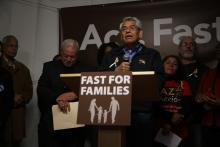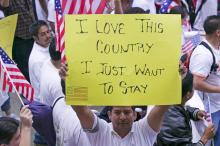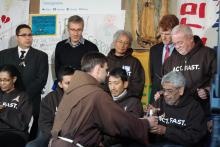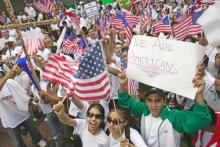Immigration




You probably haven’t heard of Sioux County, Iowa — but if you’re ever on a flight from Boston to Los Angeles, you’ll fly right over us and know you’re at the midpoint of your trip. We’re just about exactly in the middle of the country.
But aside from U.S. geography, Sioux County isn’t often known for being in the middle. We’re found in the 4th congressional district of the state — the constituency represented by Steve King, where close to 80% of our electorate is Republican.
Recently, Sioux County, Iowa was blessed with the visit of Eliseo Medina, a hero in immigrants’ rights movements for over 40 years. Eliseo was a key part of the farmworkers movement and went on strike with Cesar Chavez. He served as a board member of United Farm Workers from 1973 to 1978.
At the Sioux Center Library, approximately 130 people gathered, overflowing the room. College students and professors, church members, and Latino workers congregated to listen to a prophetic voice calling in the wilderness for God’s justice to the powerless and voiceless in our midst. Congressman King was invited but did not attend.






This President’s Day, about 20 church leaders, sympathizers, and undocumented immigrants were arrested in front of the White House as part of an act of civil disobedience to protest the nearly 2 million people who have been deported under President Obama.
The core group and about 40 supporters gathered around 1 p.m. on Monday afternoon in Lafayette Park in front of the White House. They held signs that said, “Praying for Relief” and “#Not1moredeportation,” and sang hymns in between short megaphoned speeches that told personal stories. They called for immigration reform. “Not one more, not one more,” they chanted together in both English and Spanish.
The event was organized by Bishop Minerva G. Carcaño of the United Methodist Church, who was the first Hispanic woman to be elected to her position.

Imagine a young girl growing up in a small town going off to college then law school. She then takes the bar examination and becomes a licensed attorney. She has accomplished what most people would call the American Dream.
However, one thing is missing — her father. You see, her father was deported when she was three years old and they have been separated ever since. She has lived 30 years without him.
Her father came to this country from Nigeria. He saw America as the land of opportunity. Her mother tells her that before coming to America he believed the streets were paved with gold. I’m not sure if his statement was figurative or literal, but I do know that he saw it as a wonderful opportunity.
Her father came to this country as a student on a student visa. He was able to obtain a bachelor’s and a master’s degree. He worked hard in school and earned both degrees. He longed to begin his career as an architect in America. He desperately wanted his piece of the American Dream.


The highlight of the Super Bowl for me was Coca-Cola’s "America is Beautiful" commercial. The images of the American landscape are amazing and the song was beautiful. At first I was a bit confused by the different languages singing "America the Beautiful" (I’m slow…), but I caught on about halfway through. When the commercial ended, I looked over at my wife and said, “Wow. That was beautiful … Not worth four million dollars, but that was good.”
For the moment, let’s deal with any cynicism that the Coca-Cola Company is simply trying to sell us their product. Of course they’re trying to sell us their product; that’s why they spent millions on their ad, but along the way, Coke pointed to the reason that I love the United States. I love my country because it is a nation that welcomes the “Other.” Indeed, we haven’t always been good at this, and we still struggle with it, but the United States is a nation of immigrants. Even Native Americans, who have tragically been excluded from the land they’ve lived on for thousands of years, were originally immigrants who were welcomed by this land. This land has a long history of welcoming people into it, and so any act of excluding immigrants goes against its ideal of welcoming the “Other.”


I completed my fast. I fasted for seven days as a participant in the Fast for Families: A Call for Immigration Reform & Citizenship. I fasted because Jesus cared about the "least of these" in his society, and as a follower of Jesus, I'm called to do the same. More specifically, I undertook this fast to raise awareness of these particular "least of these" in our society.
I was quite certain that some within my community of influence would disagree with me on this particular spiritual practice, whether theologically, politically, or socially. The pushback I did receive turned out to be more theological than anything. Perhaps that is just because of the circles I am in, but it went something like this, “I’m all for fasting as a personal spiritual thing, but associating it with a political cause is just wrong. Jesus came to save us from our sins and keep us individually out of hell.” The assumption is that Christianity has nothing to do with Public Square.
I'm still processing the political and governmental, not to mention partisan, implications of immigration reform. I'm certainly not under the impression that one simple bill at a federal level will "fix" immigration any more than the Civil Rights Act of 1968 fixed discrimination. Which of course is not to say that either is unimportant.

CNN reports on Usoni , a futuristic television drama produced in Kenya that is about reversed immigration. The show depicts Europe in 2063, where life has turned unlivable after a deadly series of natural and economic disasters.
Europeans are desperately seeking a way to get to a livable continent south of them: Africa. The hardships in making the trip are unfathomable, and once the immigrants arrive, they are unwelcome, harassed, and rejected. The story follows a young couple, Ophelia and Ulysse, who are seeking to make their way with their unborn child to the land of promise.
Yes, the comparisons today to those seeking to immigrate to Europe (with obvious parallels to America) are intentional. Marc Rigaudis, the Kenya-based French filmmaker who created the program, is making a point to help us walk in the shoes of those whom we know the Bible calls “aliens and strangers.”
The chilling trailer depicting people like me being treated as illegal immigrants is enough to make one’s hair stand on end.

I’m a white southerner, ordained Baptist, and have built a career over the past decade working on a broad spectrum of projects in the civic sector. In that time I’ve been blessed to lead and work on some of the most prominent issues of social change throughout the globe. Whether it was working on funding for our veterans, organs for kids who need transplants, better schools and public transit, justice for Trayvon Martin, freedom for the Wilmington 10, or on political campaigns — I’ve had the opportunity to help grow and lead some of our nation’s largest and most vital organizations. Now, inspired by those in our generation who choose to dream instead of choosing despair, I’ve stepped out on faith to join the immigration reform movement. I hope you’ll pledge to join it as well.
One of the most meaningful things I get to do in my work as a Ph.D. student in political science is assist Jim Wallis with a course he teaches at Georgetown every fall titled "Faith, Social Justice, and Public Life." Jim is well known as the founder and leader of Sojourners and as a lifelong advocate for social justice. Through lectures, discussions, and guest speakers, our students learn about how and why clergy and lay people of various religious backgrounds advocate for public policies as expressions of their faith commitments. This fall, the push for comprehensive immigration reform was one of the case studies we examined with our students.
I'm no expert in immigration policy. But, as a political scientist, I can offer an informed assessment about when, why, and how the House of Representatives will pass the reform in 2014. This will be the subject of a future post. For now, though, I want to highlight some distinctive features of the debate that I have noticed as an observer of religion in American politics. I do have a layman's interest in the theological justifications being offered in support of (and, perhaps surprisingly, against) comprehensive immigration reform. But for now, I will focus mostly on the politics.
People go to great lengths for those they love, especially when it comes to immigration reform.